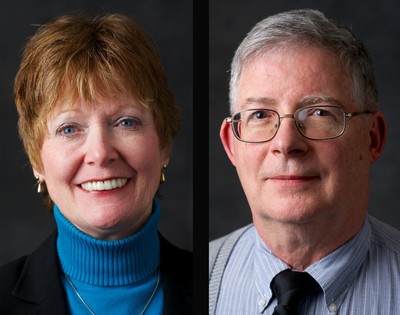Beginning the next act of their lives, two retiring employees took time to reflect on their journey with the Synod of the Lakes and Prairies of the Presbyterian Church (U.S.A.)
Diana Barber retired in January as associate executive for leadership development, and J. Jay Wilkinson will leave at the end of March after helping train the individual filling the synod’s new position of director of financial services.
In practical terms, Barber said, “if it has to do with people, it’s my responsibility.” She was the staffer behind the popular Synod School that runs for a week every summer at Buena Vista College in Storm Lake, Iowa, and worked closely on Christian education and relations with the presbyteries.
Nationally, she said, most programs like Synod School have fallen by the wayside, but “for some reason, Presbyterians in the upper Midwest like to get together.” It’s now the synod’s only big event, drawing about 600 people, including nearly 200 children and youth, to a week of worship, education and fun.
“There are things about work I won’t miss,” from her 31 years with the synod, Barber said, “but I will miss the people. Seeing kids have fun, helping adults become more effective leaders—that’s what encourages me.”
Over the years, as staff and congregations have shrunk, programming has also diminished, but Barber said that the synod now does less “think of something and assume that they want it,” and more helping presbyteries respond to congregational requests.
“It used to be that everyone looked to the next level to lead,” Barber said. “Not now. If the larger church is going to continue, it’ll be because we figured out a new way to focus on congregations.” The silver lining to having fewer resources, she said, is that “we look again at what’s really important, and what makes us church as opposed to an institution.”
She spent time in several mainline Protestant denominations in her youth, but as an adult “came to understand what it really means to be Presbyterian. There’s no ‘bishop;’ we don’t make decisions by ourselves; our leadership is in the group. There’s something about all that that I resonate with.”
Wilkinson came to the synod in 1994, after growing dissatisfied with his work as vice president of finance for a corrugated box company in Appleton, Wis. He realized he had to do something different, and the transition to the nonprofit world was easier than he expected. “I’d like to think the Holy Spirit had something to do with it, convincing me that a lower salary was something I could deal with,” he said. “I don’t think I ever wished I hadn’t made the move.”
As treasurer, Wilkinson has handled all of the synod’s money matters for 22 years, including being the staff liaison for the committee that makes loans to churches for capital projects. Up to 90 percent of the synod’s $5.5 million loan fund is loaned out at any given time, with priority going to churches that would not qualify for a bank loan. He also provides payroll services for 15 of the synod’s 16 presbyteries, and bookkeeping services for nine.
About 10 years ago, he also took over the position of stated clerk, because, as he remembers it, the synod executive said, “I have it on good authority that you’re not busy between midnight and 6 a.m.” In that role, he serves as corporate secretary, offers advice on the church constitution and manages the judicial process.
Looking back, both retirees are struck by the decline in synod staff and programming, a reflection of the membership losses of the national church. The office in the Twin Cities now has seven people, instead of 17 when Wilkinson came aboard in 1994. “The church will last through my lifetime,” Wilkinson said, “but I’m concerned for the next 100 years.”
The two departures will mean a loss of institutional memory, said synod executive Elona Street-Stewart. Because of the various roles they have played in the national church, “people know them wherever you go. They’re like an index—you go to Jay or Diana to figure out what you need.” At the synod, she said, Wilkinson has consistently reminded others that “resources are given to us for work. Our task is not to hold onto them, but to make sure they’re distributed in a way that follows the mission.”
Barber plans to travel, visit family, and volunteer. “My life has been so immersed in church,” she said. “I’m looking forward to meeting people I didn’t meet in church.”
Wilkinson and his wife, Kathie, will spend time with their three children and seven grandchildren. As for other activities, “I’m waiting for the Holy Spirit to lead me,” he said. “I don’t plan on sitting in a rocking chair.”

